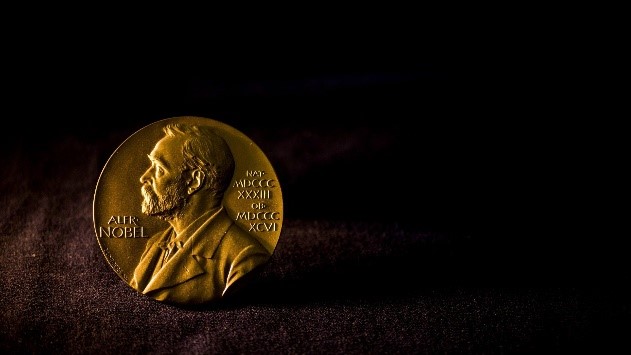Description

Disclaimer: Copyright infringement not intended.
Context
- The Nobel Foundation withdrew its invitation for representatives of Russia, Belarus, and Iran to attend this year’s Nobel Prize award ceremonies.
About Nobel Foundation
- The Nobel Foundation is a private institution founded on 29 June 1900 to manage the finances and administration of the Nobel Prizes.
- The foundation is based on the last will of Alfred Nobel, the inventor of dynamite.
- It also holds Nobel Symposia on important breakthroughs in science and topics of cultural or social significance.

All about Noble Prizes
- The Nobel Prizes are five separate prizes that, according to Alfred Nobel's will of 1895, are awarded to "those who, during the preceding year, have conferred the greatest benefit to humankind."
- Alfred Nobel was a Swedish chemist, engineer, and industrialist most famously known for the invention of dynamite. He died in 1896.
- In his will, he bequeathed all of his "remaining realizable assets" to be used to establish five prizes which became known as "Nobel Prizes." Nobel Prizes were first awarded in 1901.
- Nobel Prizes are awarded in the fields of Physics, Chemistry, Physiology or Medicine, Literature, Economics, and Peace.
- In 1968, Sveriges Riksbank (Sweden's central bank) funded the establishment of the Prize in Economic Sciences in Memory of Alfred Nobel, to also be administered by the Nobel Foundation.
- Nobel Prizes are widely regarded as the most prestigious awards available in their respective fields.
- The prize ceremonies take place annually. Each recipient (known as a "laureate") receives a green gold medal plated with 24 karat gold, a diploma, and a monetary award.
- A prize may not be shared among more than three individuals, although the Nobel Peace Prize can be awarded to organizations of more than three people.
- Although Nobel Prizes are not awarded posthumously if a person is awarded a prize and dies before receiving it, the prize is presented.
- From 1974, the Statutes of the Nobel Foundation stipulate that a prize cannot be awarded posthumously, unless death has occurred after the announcement of the Nobel Prize. Before 1974, the Nobel Prize has only been awarded posthumously twice.
- Self-nomination is not allowed. Except for the Nobel Peace Prize, nomination is by invitation only and nominators must fulfil the criteria set out by the awarding institutions
- Nominations are only made public 50 years later, after which they are put in public domain
- The Nobel Prize, beginning in 1901, and the Nobel Memorial Prize in Economic Sciences, beginning in 1969, have been awarded 609 times to 975 people and 25 organizations.
- Linus Pauling is the only person to have been awarded two unshared Nobel Prizes – the 1954 Nobel Prize in Chemistry and the 1962 Nobel Peace Prize.
- Switzerland-based International Committee of the Red Cross is the only 3-time recipient of the Nobel Prize, being conferred with the Peace Prize in 1917, 1944, and 1963.
- British polymath Bertrand Russel holds the record for the most nominations- 47. He won the Nobel for Literature in 1950.
- 9 Indians have so far won the prize- Rabindranath Tagore (1913, Literature), CV Raman (1930, Physics), Har Gobind Khorana (1968, Medicine), Mother Teresa (Peace, 1979), Subrahmanyan Chandrasekhar (1983, Physics), Amartya Sen (1998, Economics), Venkatraman Ramakrishnan (2009, Chemistry), Kailash Satyarthi (2014, Peace), Abhijit Vinayak Banerjee (2019, Economics)
- Some important Indians who missed out
- Mahatma Gandhi (Peace- 1937, 1938, 1939, 1947, 1948)
- Meghnad Saha (Physics- 1930, 1937, 1939, 1940, 1951, 1955)
- Satyendra Nath Bose (Physics- 1956, 1959, 1962)
- Chandrasekhara Raman (Physics- 1929, 1930)
- Homi Bhabha (Physics- 1953, 1954, 1955)
Who selects the Nobel Prize laureates?
- In his last will and testament, Alfred Nobel specifically designated the institutions responsible for the prizes he wished to be established: The Royal Swedish Academy of Sciences for the Nobel Prize in Physics and Chemistry, Karolinska Institutet for the Nobel Prize in Physiology or Medicine, the Swedish Academy for the Nobel Prize in Literature, and a Committee of five persons to be elected by the Norwegian Parliament (Storting) for the Nobel Peace Prize.
- In 1968, the Sveriges Riksbank established the Sveriges Riksbank Prize in Economic Sciences in Memory of Alfred Nobel. The Royal Swedish Academy of Sciences was given the task to select the Laureates in Economic Sciences starting in 1969.
The Nobel Prize in Physics
- The physics laureates are selected by the Royal Swedish Academy of Sciences.
|
The Royal Swedish Academy of Sciences is one of the royal academies of Sweden. Founded on 2 June 1739, it is an independent, non-governmental scientific organization that takes special responsibility for promoting natural sciences and mathematics and strengthening their influence in society, whilst endeavoring to promote the exchange of ideas between various disciplines.
Every year, the academy awards the Nobel Prizes in physics and chemistry, the Sveriges Riksbank Prize in Economic Sciences in Memory of Alfred Nobel, the Crafoord Prize, the Sjöberg Prize and several other awards.
|
The Nobel Prize in Chemistry
- The chemistry laureates are selected by the Royal Swedish Academy of Sciences.
Prize in Economic Sciences
- The economic sciences laureates are selected by the Royal Swedish Academy of Sciences.
The Nobel Prize in Physiology or Medicine
- The medicine laureates are selected by the Nobel Assembly at Karolinska Institute.
|
The Nobel Assembly at the Karolinska Institute is a body at Karolinska Institute which awards the Nobel Prize in Physiology or Medicine. The Karolinska Institute is a research-led medical university in Solna within the Stockholm urban area of Sweden. The main work involved in collecting nominations and screening nominees is performed by the Nobel Committee at the Karolinska Institute, which has five members. The Nobel Committee, which is appointed by the Nobel Assembly, is only empowered to recommend laureates, while the final decision rests with the Nobel Assembly.
|
The Nobel Prize in Literature
- The literature laureates are selected by the Swedish Academy.
|
The Swedish Academy founded in 1786 by King Gustav III, is one of the Royal Academies of Sweden. Its 18 members, who are elected for life, comprise the highest Swedish language authority. Outside Scandinavia, it is best known as the body that chooses the laureates for the annual Nobel Prize in Literature, awarded in memory of the donor Alfred Nobel.
|
The Nobel Peace Prize
- The peace laureates are selected by the Norwegian Nobel Committee.
|
By the terms of Alfred Nobel’s will the Nobel Peace Prize has been awarded by the Norwegian Nobel Committee since 1901. Alfred Nobel left no explanation as to why the prize for peace was to be awarded by a Norwegian committee while the other four prizes were to be handled by Swedish committees.
The Norwegian Nobel Committee is composed of five members appointed by the Storting (Norwegian Parliament). The committee’s composition reflects the relative strengths of the political parties in the Storting, and is assisted by specially appointed expert advisers.
|

|
PRELIMS PRACTICE QUESTION
Q. Consider the following statements with reference to Noble Prizes?
1. A Noble Prize cannot be shared among more than four individuals.
2. Nobel Prizes are not awarded posthumously.
3. The Noble Naureates in Physics, Chemistry, Economic Sciences and Physiology or Medicine are selected by the Royal Swedish Academy of Sciences.
4. Self-nomination is not allowed in Noble Prizes.
How many of the above statements are correct?
A) Only 1
B) Only 2
C) Only 3
D) All
Answer: A) Only 1
Correct statement: Nobel Prizes are not awarded posthumously.
Note: Self-nomination is not allowed in Noble Prizes except for the Peace Prize.
|
https://www.hindustantimes.com/world-news/russia-iran-out-from-nobel-prize-event-this-year-invitation-revoked-after-flak-101693662634647.html












